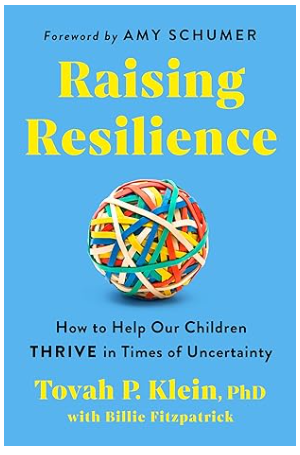Child psychologist Tovah Klein visited the special schools in China where kids are given a vast amount of time and space for free play. What she saw blew her away.
The kids seemed so much more creative, competent, and curious than the kids she saw here.
So today’s wisdom comes from her new book, “Raising Resilience: How to Help Our Children Thrive in Times of Uncertainty.” (With a foreword by Amy Schumer. She knows from play!)
Tovah has spent three decades working with families, including traumatized ones. Her book s about how to maintain a strong, healthy parent-child bond, even in challenging times.
As you’ll see, Tovah is a big fan of giving kids more trust and independence, which is why we have been following her work for so long!
SHOWING KIDS YOU BELIEVE IN THEM (BY STANDING WAAAAAY BACK) – by Tovah Klein
Separation means becoming one’s own person. And becoming their own person means having their own thoughts, ideas and desires to make decisions for themselves.
I saw this type of thinking and learning firsthand on multiple visits to a unique set of schools in China called Anji Play and speaking at their True Play conference.
In Anji Play schools, preschoolers and kindergartners are given broad latitude and freedom to play and learn in vast spaces with adults observing but not directing or interfering.
I saw something I’d never seen before.
What I witnessed were levels of collaboration, risk taking, experimentation and elaborate problem solving beyond what I have ever watched in US settings. Children challenged themselves to learn when given space to play and own their own learning.
For example, without set rules established by adults, children repeatedly built elaborate and large climbers or ramps for balls and tires to flow down. They next pushed themselves to complicate the apparatus and test gravity by changing angles or sizes of what they rolled on the ramps.
Without our “help” the kids did so much more on their own.
Mistakes? Plenty. They seemed to think of everything as problem solving, exhilarating risk taking, and hypothesis testing. When left to themselves, children eagerly came up with ideas and worked together with intensive negotiation, disagreement, and compromises as they decided how to improve what they were collaboratively working on.
When we give children room to explore, try different ways to solve problems, and use their curiosity to motivate their learning, we free them from the dichotomy of thinking there is only one right way to do something.
How to make that kind of competence happen here.
As a parent, it can be hard to stay back and not run in and rescue when children flounder or fall. We want to remedy it so they are not frustrated or upset with themselves. Instead, we are likely taking away that opportunity for a child to pause and reflect on what they did; to come up with new ways of solving a dilemma; to be more creative about how they approach a task; or simply decide to walk away and come back another time.
Our rescuing them sends a strong message: we don’t believe they can handle making a mistake or that making a mistake will hurt them and therefore is something to avoid entirely. If that is the message, we unwittingly undermine the resilience that comes from bouncing back after falling, failing or when things don’t go as planned. Learning is rarely straightforward.
Step back so kids step up.
Sometimes children grasp a skill or task quickly, sometimes not. But each time they approach a task or try a new skill children learn something — maybe they learn how to multiply complex numbers and maybe they learn that they have to put in more effort…
When we step in too quickly as our child struggles, we can inadvertently make our children feel insecure. Take the six-year-old who on the playground is left out of the play of other children nearby. You worry: Will he ever approach children and make his way? Why aren’t they inviting him in? Should I go ask for him?
And wait, wait, wait.
Watching and waiting may give him a chance on his own. Soon, those two are playing together, and eventually, they are playing with the bigger group. With time and at his pace, he makes his way and runs back to tell you, “Daddy, I made a new friend!”
When we give them the space to figure out things for themselves or get back up after falling, we signal our trust and belief in them. – T.K.




1 Comment
The professional roles and values in nursing https://www.nursingpaper.com/examples/philosophical-and-cultural-tension-between-science-and-religion-essay/ are so important, but writing about them can be challenging. This essay example was super helpful—it covered everything from ethics to leadership, and it was written in a way that made the concepts easy to apply to my own experiences in nursing school.